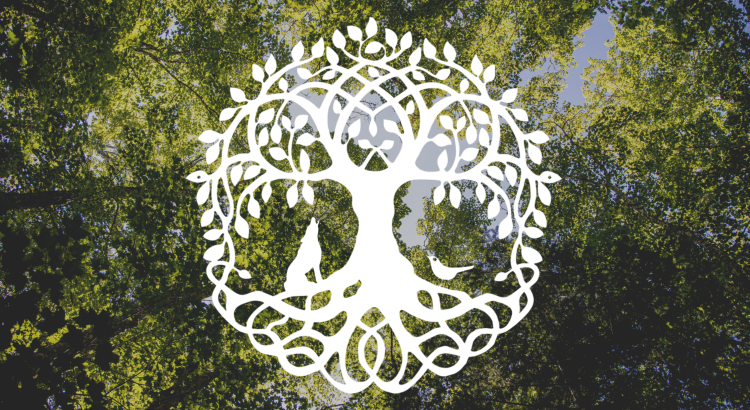In response to the damage created by post-tropical storm Fiona, and the anticipated long recovery process for INT’s forested areas, the Trust has recently launched an initiative aimed at protecting and stewarding important native seed trees. Through Seed Tree Sponsorship we are asking individuals and businesses to sponsor an identified seed tree in one of our natural areas. These trees, with their proven DNA, will be instrumental in the natural regeneration of their respective immediate landscapes, not to mention great seed providers for nurseries dedicated to ensuring a steady supply of native species for planting.
Read moreCategory: Invest In Nature
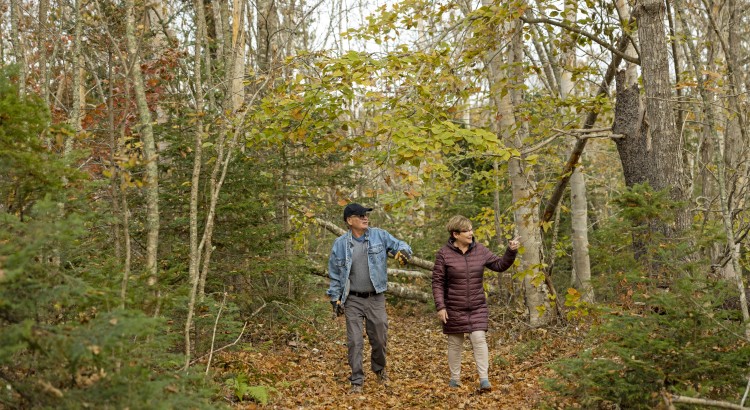
Buote family donates legacy upland hardwood forest in New Glasgow
It’s a crisp fall morning. The leaves crunching under our feet betray the silence as Rowena Lawlor and Faren Buote accompany me into the Buote Heritage Woods Natural Area in New Glasgow. The stand of old white pine trees greeting us at the entrance to the trail have a stoic presence. The forest is looking unusually skeletal for this time of year from the impact of Hurricane Fiona. Only a few isolated red and amber patches are visible, indicating some leafed branches were spared the intense winds that tore through the rest of the canopy a few weeks earlier.
‘This is the spot where my siblings and I came across a large owl last year,’ says Rowena, one of eight siblings who – as a family – donated the woods to Island Nature Trust in 2021. Her voice crackles with emotion. ‘Walking together in the woods it suddenly appeared ahead of us in the trees. It felt like the owl was our mother Clarice proudly looking down on us. She would have been so happy to know that this land is now protected, forever’.
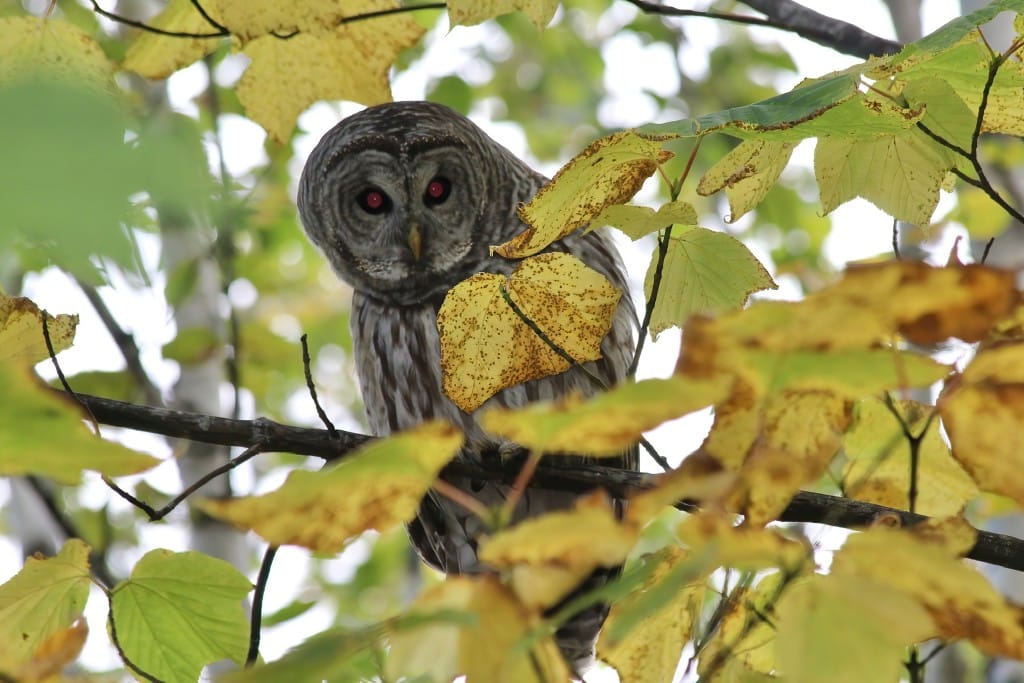
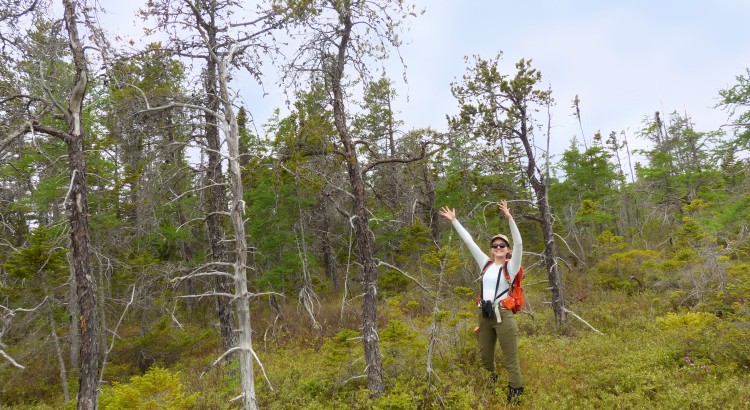
MacKay Family Donates 268 Acre Lowland Forest and Wetland to Add a Patch
Last year, five parcels were donated to the Add a Patch campaign to be protected in perpetuity. The largest of these properties was donated by the MacKay family in 2021 – sitting next to Strang Road in Haliburton, Prince County – it features a sizeable area of carbon absorbing peatland and bog. The habitat is known to support Canada warbler, while housing several uncommon, tracked flora such as royal fern, Vermont blackberry, white fringed orchid and rose pogonia.
Read more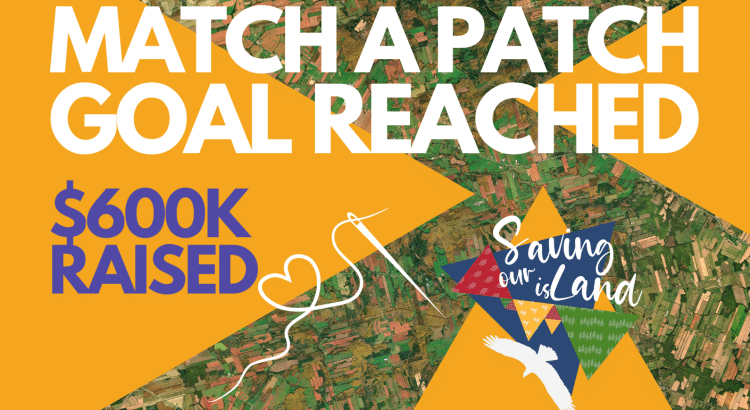
Islanders & INT conservation partners team up to successfully raise $600K for natural area protection in PEI
Futures Protected: Island Nature Trust announces first major campaign fundraising success as conservation partners quadruple donations from Islanders
Read more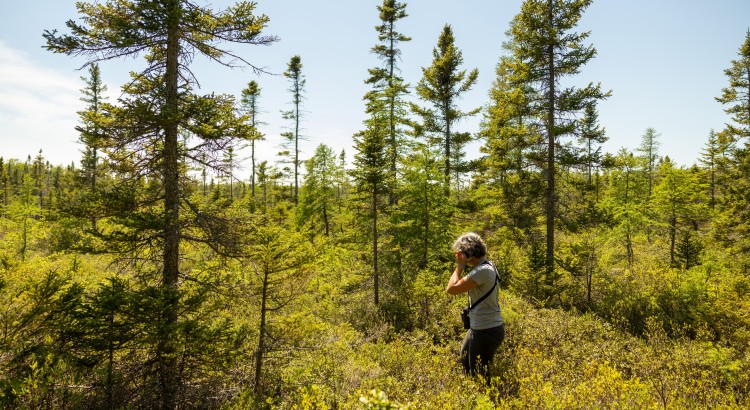
First of its kind donation sees American family return forest and wetland back to Islanders
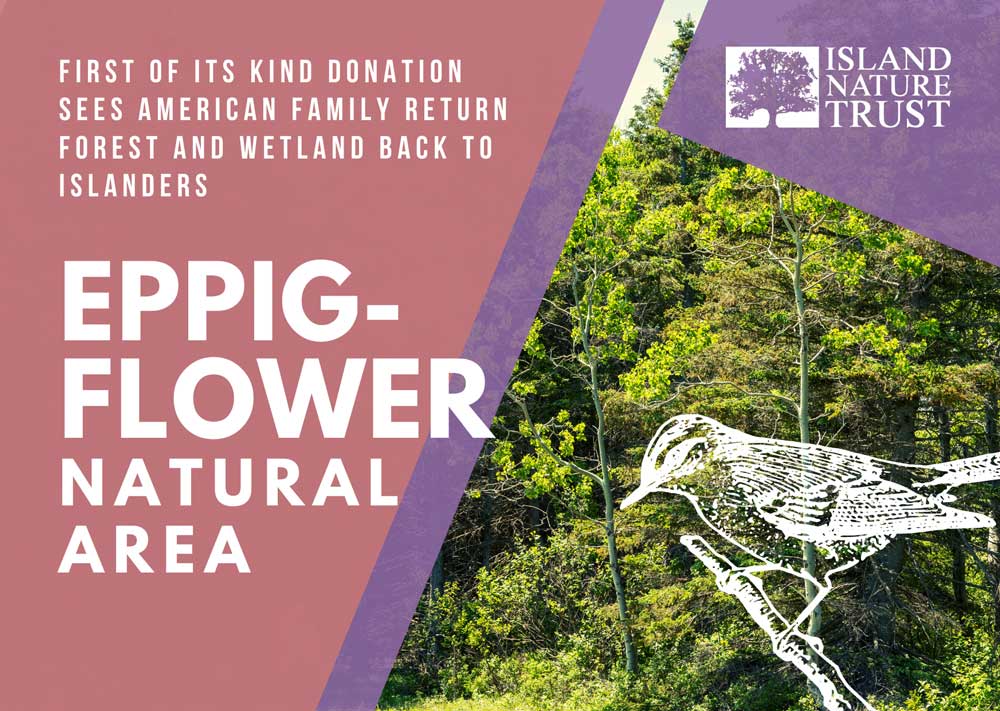
A game-changing cross-border partnership between Island Nature Trust and American Friends of Canadian Conservation – launched to help American landowners donate their land for conservation purposes – is celebrating its first win.
American ownership is approximately 3.5% of the total land on PEI, yet for many years, American landowners interested in donating land for conservation purposes have experienced disproportionate legal and financial barriers. However, thanks to INT and American Friends initiative forged in 2018, significant tax relief is now secured for American donors.
Read more
An Introduction to Ecosystem Services
By Janell Smith
What are ecosystem services and why are they important?
Ecosystem services are the benefits that nature provides to humans and are often categorized into provisioning, regulating, supporting and cultural. You may be most familiar with provisioning ecosystem services – including food from forests, fields, and oceans; lumber for timber and firewood; drinking water; and even natural gas and oil. Other provisioning services include plants for clothing and materials, as well as natural medicines.
Regulating services provided by natural ecosystems include climate regulation, pollination, purification of water, erosion control, flood control, and carbon storage. Supporting services include the processes that often go unseen but are fundamental to human health, such as soil formation, nutrient cycling, and water cycling. Cultural services are the non-material benefits provided by nature through spiritual enrichment, inspiration, recreation, and aesthetic value (as you can see, ecosystem services are vital to our everyday lives!). As with all life, the categories of ecosystem services are interconnected. For example, fruit trees (provisioning service) rely on the soil (supporting service) and pollination (regulating service) to thrive.
Read more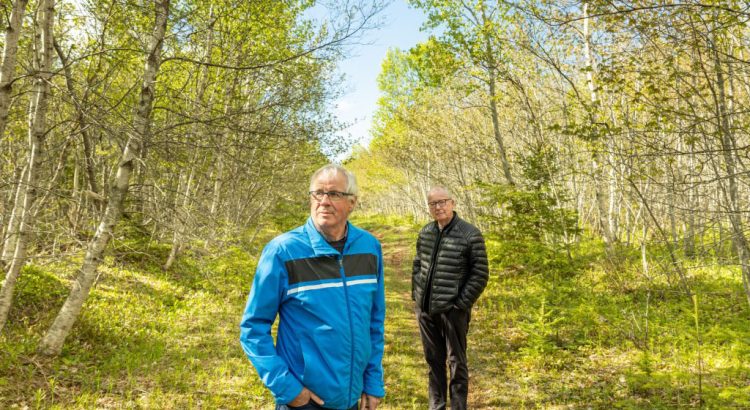
Island Nature Trust secures significant carbon sink in its largest single acquisition to date
136 hectare (337 acre) property in Forest Hill contributes to a sizeable unfragmented block of rich lowland forest in PEI and is home to C02 absorbing fen peatland – a natural combatant against global warming
Read moreFresh water refuge for endangered spawning Atlantic salmon protected forever in Vernon River
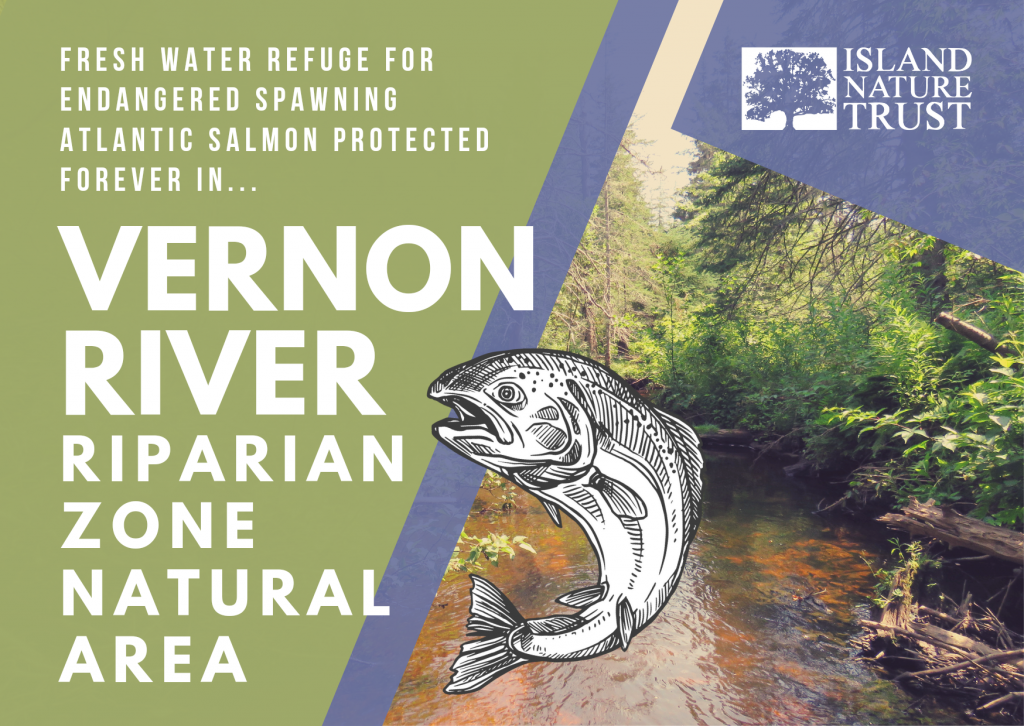
Surrounded by an extensively farmed watershed, the ecologically diverse riparian forest provides a stable buffer for two headwater tributaries delivering spring water to Vernon River and Orwell Bay.
Read morePenny’s Point Natural Area: Iconic coastline saved from development in Fortune Bridge
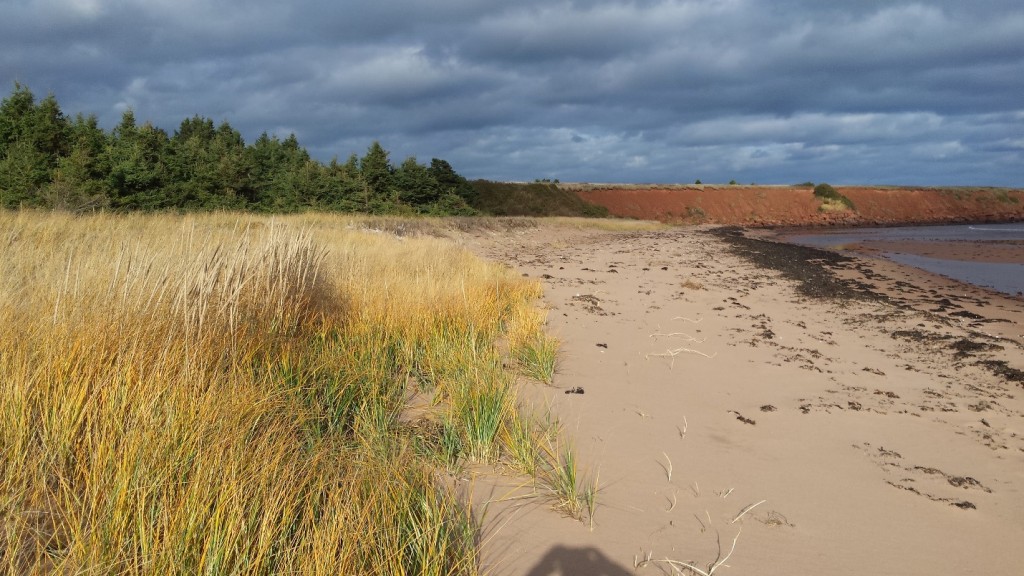
This beautiful yet fragile coastal headland will now be protected forever.
The peninsula, named Penny’s Point Natural Area, is located within the Rollo Bay Wildlife Management Area and is on the south point at the mouth of Rollo Bay. It was transferred to Island Nature Trust for perpetual stewardship in December, through a most generous and thoughtful donation. Land donors Tom Welch, Anne Lambert and Nancy Willis were resolved to see this coastline remain in a natural state forever.
Read moreMapleCross fund and Island Nature Trust ensure Lewes forest remains protected
Island Nature Trust launches search for new Executive Director
Lewes forest, in King’s County, is one of Prince Edward Island’s many natural treasures and it will now be protected forever thanks to the MapleCross fund and Island Nature Trust donors.
Ella Stewart is one of many Islanders who feels a deep connection with nature and has made a thoughtful decision to keep it in its natural state. She and her family, especially her late husband John, cared for the Lewes forest for decades, managing it well from the end of the second World War until John’s passing a few years ago. As the forest held so many wonderful memories, they wanted to see the natural space conserved. Worried that the land would be converted to blueberry fields, Ella was relieved when Island Nature Trust offered to buy the land and protect it forever.
MapleCross Upland Hardwood Natural Area
Thanks to a majority contribution from the MapleCross Fund and additional generous donations from 25 Islanders, Island Nature Trust was able to secure the Lewes property. This beautiful 109-acre property contains old growth upland hardwood Maritime Acadian – Wapane’kati forest, now rare in Prince Edward Island and the Maritimes as a whole. Mature eastern hemlock, white pine, sugar maple, red maple, American beech and yellow birch are present in an uneven aged mixed wood mosaic, providing tremendous value as a seed source for surrounding younger forests. Two headwaters streams begin within the property and support a diverse array of wildlife, including at least one pair of the threatened songbird, olive-sided flycatcher.
This forest also abuts the homestead property of former Premier and conservationist, J. Angus MacLean. The marriage of these two well-stewarded forest areas secures inter-connectivity and greater movement for wildlife in a larger forested block. Due to the dedication of a community of conservationists, the MapleCross Upland Hardwood Natural Area is now protected forever.
Executive Director Sought
As announced at its Annual General Meeting in September, Island Nature Trust is currently searching for a new Executive Director to focus more intently on organizational growth and development.
The Executive Director is the Trust’s senior staff position and team leader, with overall responsibility for all aspects of the organization‘s operations including high level fundraising to support land acquisition and stewardship, programs, staff, and finances, as well as direct accountability for member, donor and strategic partner relationships.
Quick Facts
- The Island Nature Trust was created in 1979.
- The Trust is governed by a volunteer Board of Directors who provide the strategic direction and priorities for the organization.
- The Trust is committed to environmentally and socially responsible management of natural areas on PEI.
- The Trust is a key provider of technical, science-based knowledge on land stewardship and wildlife on PEI for landowners, governments, and partner environmental groups.
Associated Links
